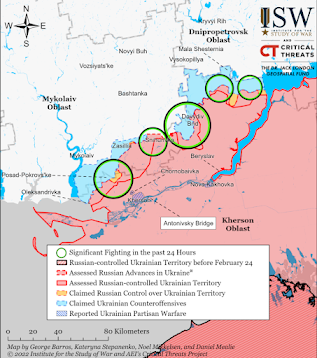The Greater East Asia Co-Prosperity Sphere"Imperialism, as it was known in the nineteenth century, is no longer possible, and the only question is whether it will be buried peacefully or in blood and ruins."
– Leonard Woolf, 1928
Blood and Ruins (2021) takes an approach to World War II that I am surprised I haven't seen more of lately. Overy, a British professor, argues that the war was more about empire than it was about nationalism, and that the basic goal of the Germans, Japanese and Italians was to get empires of their own just like those of the British and French. He never actually says that nothing the Axis powers did in pursuit of empire was worse than what the British, French, and Russians had done to get theirs, and he has a long, detailed chapter on war crimes, but by constantly making small comparisons and emphasizing the imperial ambitions and rhetoric of the Axis he gradually grinds down any notion that World War II was a unique event. Here is one example out of hundreds, about Japanese policy in conquered Malaya:
Some resettlement schemes were operated to prevent remote villages from assisting the rebels, but on nothing like the scale in Manchukuo, or the later dislocation of millions during the British 1950s counter-insurgency. (191)
If I had to summarize the argument in a sentence, it might go like this: conquering and ruling empires and disposing of whole peoples who got in the way was what powerful states have done for as long as there have been powerful states, so nothing more is needed to explain World War II than to acknowledge that imperial thinking remained alive down to 1945.
In form this 878-page book has a long introductory chapter, followed by a 350-page narrative of political and military events from 1931-1945. (Which might be the best 350-page narrative of the war, or any event that big, that I have ever read.) Then come a series of chapters that take on particular themes: mobilizing nations for total war; the evolution of tactics in the era of air power, armored assault, radar, and other changes; war production; how the war was justified by the combattants; home fronts; wartime psychology; war crimes and war crimes trials. I found this material interesting but it wasn't much fun. It struck me that I wanted to know this material but didn't really want to read it, and since I am unlikely to remember details like the staggering numbers for US Lend-Lease to the Soviets (482,000 trucks, 1,900 railroad locomotives, etc., etc.), the best solution would be just to buy the book and keep it on my shelf. Overy's conclusion follows the dissolution of the British and French empires down into the 1960s, driving home the argument that the war was about empire and its main effect was to discredit that whole way of thinking and ruling.
The most interesting part of the book is Overy's narrative of the 1930s. I knew that many British leaders of that era habitually referred to their state as "The Empire," but I did not know that many conservative Frenchmen did the same. Just as many British and French leaders spoke of their empires as essential for their own nations, leaders of the future Axis states spoke of obtaining empires as essential for theirs. Historians have dubbed this "catastrophic nationalism." In speech after speech, leaders claimed that without conquest and expansion, their nations were doomed. One Japanese nationalist wrote that Manchuria was "a lifeline from which is impossible to retreat if the nation expects to endure." (35)
The Depression made these imperial ambitions more urgent, as free trade was curtailed and the world was divided into trading blocs. Both the British and the French lowered tarriffs on imports from the empires (and Britain's Commonwealth) while raising them on everyone else. The future Axis powers all bitterly resented being excluded from these blocs and concluded that for their economic safety they needed captive trading blocs of their own.
And empire of course meant war. The pro-imperial leaders in the future Axis states did not shun this, but embraced it:
The generation that grew to political and military leadership in the 1930s grew up with the world of imperial fantasies, surrounded by a culture that played up the superiority of modernizing and 'advanced' states as leaders in the march of civilization . . . a generation that was profoundly affected by the experience of wars and the violent assertion of modern nationhood. Empire, claimed the Italian Fascist leader Giuseppe Bottai, beiefly governor in 1936 of Ethiopia, had 'worked this desire in me to live war in the depths of my consciousness.' (35)
War was protrayed, not as something to be shunned, but as the path of glory that would end in empire. Mussolini said, "We must become ever more a military nation."
The case of Germany is of course the hardest one for Overy's thesis. Even Winston Churchill saw Italy's imperial ambitions as not much different from Britain's, and Japan's desire to dominate the region from which it drew resources at least makes historical sense. Making sense of the Nazis is much more difficult. Sometimes they spoke in terms of a conventional empire; Hermann Goering told one British diplomat, "What we want is an empire." (35) When they were shut out of the British and French trading zones, they reacted by imagining a trading zone of their own stretching to the Urals. A German economic minister once said, "It is clearer than ever that for an industrial state the possession of colonial areas for raw materials to expand the home economy is indispensable." (57) According to Overy, Hitler was surprised that his invasion of Poland led Britain and France to declare war, when Mussolini's invasion of Ethiopia had not. It was, he thought, just another imperial conquest of barbarians, not worth a war among civilized nations.
But with this was mixed all manner of other strange ideas; why would a nation bent on building an empire in Eastern Europe insist that its main enemy was not the Russians but the Jews? Actual German policy in the east was a complete mess, with an array of incompatible goals. Poland and Ukraine were supposed to produce food and metal ores for Germany, as well as supplying labor to build roads, railroads, and so on – which required maintaining a large population in the region – but on the other hand the people were supposed to be expelled or exterminated to make room for the millions of Germans who were going to migrate there. Who did not actually exist; despite Nazi ideologizing and financial incentives, only a few thousand German civilians actually moved to the conquered eastern lands, very few of them farmers. The weird notion that Germans and Jews were locked in a great struggle and only one of them could survive seems, to me anyway, hard to explain in terms of imperial ambition. And while it is true that many empires have enacted genocidal wars against enemy peoples, the bureaucratic and technological mass murder of the Nazis seems to me like something rather different. Then there is the ideological struggle against communism, which was of course central to Nazi rhetoric.
Overy does show that Hitler's quest for "living space" had older imperial precedents; apparently lebensraum was how some Germans referred to their 19th-century empire in Africa. Some of you have probably heard that Hitler admired how the US had treated American Indians and sometimes seemed to hope that the people of eastern Europe would disappear in the same way so the East could be Germany's Wild West. He once remarked that he would pacify the people of Ukraine with "beads, and scarfs, and other things people of that sort desire."
But I still have trouble seeing the Nazi push to the east as just another colonial conquest like thousands of others in history. Come to think of it, the case of Japan also raises problems. In 1890 to 1920 they behaved much like a European colonial power, but then they somehow went crazy. The mass suicide of the civilian population of Guam as the Americans closed in symbolizes for me something very much awry in Japanese culture, a turn toward death for its own sake that is, again, hard to explain through a desire for empire and economic security.
To Overy's credit, he supplies you with all the facts you need to make this sort of argument for yourself, Blood and Ruins is a very impressive book, and I think the argument it makes is worth pondering.




















































